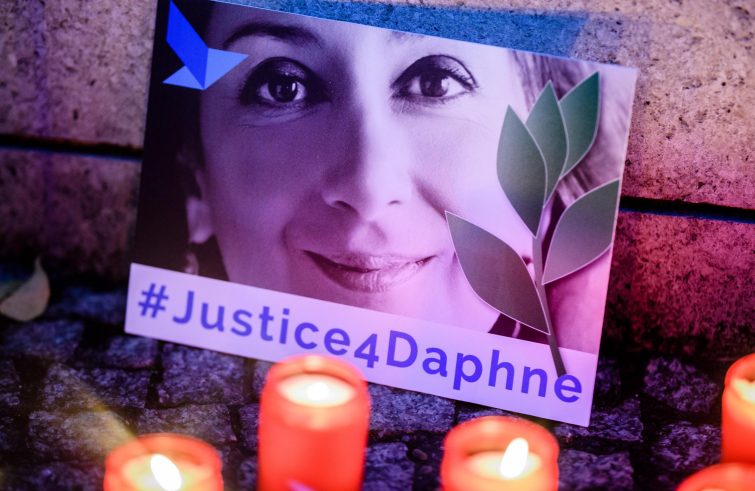
On October 16, three years will have passed since the heinous murder of Daphne Caruana Galizia, the Maltese journalist killed because her investigative reporter activity was deemed unbearable. Judicial inquiries have not yet shed light on the person who commissioned the murder. Her husband Peter, together with their three children Matthew, Andrea and Paul, are continuing their fight to establish the truth regarding the case of corruption and fraud, allegedly extending beyond the small island of Malta. Her family is left with a burdensome legacy; a Foundation has also been created in her name which keeps her memory alive.
 Ongoing investigations. Three people have been charged with carrying out the assassination, yet the instigator of the murder is still unknown. Inquiries are intricate and complex. The latest development is the arrest of Keith Schembri, former Head of Cabinet of Prime Minister Muscat, in prison (again) since September 22 on charges of money laundering. This pawn will perhaps serve to clarify the shady ties between business and politics – the focus of Daphne Caruana Galicia’s investigations – during the long term in office of Prime Minister Joseph Muscat, widely credited with having economically relaunched his small island, but – according to some – at the same time ceding its soul to corruption. Moreover, after having stepped down from the role of Prime Minister in January, in the past few days Muscat also resigned his seat in Parliament among the ranks of the Labour Party. “Muscat may have paid a political price for his acts of commission and omission,” wrote The Times of Malta reporting the news, noting that “the wheels of justice have recently started to grind with slightly less friction than during his time in office.” A Maltese Independent Commission of Inquiry has been at work since last November, at the request of the Council of Europe;
Ongoing investigations. Three people have been charged with carrying out the assassination, yet the instigator of the murder is still unknown. Inquiries are intricate and complex. The latest development is the arrest of Keith Schembri, former Head of Cabinet of Prime Minister Muscat, in prison (again) since September 22 on charges of money laundering. This pawn will perhaps serve to clarify the shady ties between business and politics – the focus of Daphne Caruana Galicia’s investigations – during the long term in office of Prime Minister Joseph Muscat, widely credited with having economically relaunched his small island, but – according to some – at the same time ceding its soul to corruption. Moreover, after having stepped down from the role of Prime Minister in January, in the past few days Muscat also resigned his seat in Parliament among the ranks of the Labour Party. “Muscat may have paid a political price for his acts of commission and omission,” wrote The Times of Malta reporting the news, noting that “the wheels of justice have recently started to grind with slightly less friction than during his time in office.” A Maltese Independent Commission of Inquiry has been at work since last November, at the request of the Council of Europe;
The family has repeatedly and in vain asked the Attorney General of Malta to contact Europol and activate an international investigation unit.
Not least because the ramifications of the case that Daphne uncovered extended far beyond Malta. There is now some hope represented by the head of European Public Prosecutor’s Office (EPPO) Laura Codruţa Kövesi and the 22 EU prosecutors who took their oath of office on September 28th. In fact, in her acceptance speech, Ms. Kövesi pledged to resolve the case of Daphne Caruana Galicia and the case of another journalist, Slovakian Jan Kuciak, killed with his girlfriend on February 25, 2018, in an attack linked to his investigative activity on tax fraud in his country.
A long list. A high number of murdered journalists were killed because they were doing their job too well. The sad list includes Anna Politkovskaya, who was investigating human rights violations in Russia and Chechnya: the identity of the person who killed her in October 14 years ago is still unknown; young journalist Lyra McKee was killed on April 18, 2019 in Derry, Northern Ireland, while investigating unrest in the area.
The New IRA admitted responsibility for the murder by one of its volunteers “while she was standing beside enemy forces.”
Sajid Hussain Baloch, editor-in-chief of Balochistan Times, was found dead in the Fyris River just north of Uppsala, Sweden, on 23 April. He was forced to flee Pakistan in 2012 because of death threats: he was investigating on a string of disappearances and organized crime in his country. On June 20, 2019, Ukrainian journalist Vadym Komarov died from injuries sustained in an attack 6 weeks earlier. He was working on a report on corruption in sports academies.
 On October 6, 2018, 30-year-old Bulgarian Viktoria Marinova was raped and strangled to death in a park in Ruse. A few days earlier she aired a TV show featuring investigations related to the illegal redirection of European funds. Mentioned should be made of the journalists of Charlie Hebdo, killed in the attack on January 7, 2015, or Jamal Khashoggi, Washington Post contributor who disappeared on October 2, 2018, in the Saudi Arabian consulate in Istanbul. Free lance reporter Kim Wall disappeared on August 10, 2017, while Polish investigative journalist Lukasz Masiak was killed in the night between June 13 and 14, 2015 in Mlawa for his investigative reports on the local authorities.
On October 6, 2018, 30-year-old Bulgarian Viktoria Marinova was raped and strangled to death in a park in Ruse. A few days earlier she aired a TV show featuring investigations related to the illegal redirection of European funds. Mentioned should be made of the journalists of Charlie Hebdo, killed in the attack on January 7, 2015, or Jamal Khashoggi, Washington Post contributor who disappeared on October 2, 2018, in the Saudi Arabian consulate in Istanbul. Free lance reporter Kim Wall disappeared on August 10, 2017, while Polish investigative journalist Lukasz Masiak was killed in the night between June 13 and 14, 2015 in Mlawa for his investigative reports on the local authorities.
Undue pressure and violence. Some journalists were so exasperated by the pressure they were subjected to that they committed suicide, as happened a few days ago in Nizhny Novgorod, Russia, where Irina Slavina set herself on fire after the police had searched her flat looking for materials related to opposition group Open Russia, supported by Mikhail Khodorkovsky. Some journalists have been arrested and condemned on false and spurious charges.
The most recent case is that of Jovo Martinović, sentenced on October 9 in Montenegro on charges of drug trafficking, but he was investigating illicit arms trafficking.
The Council of Europe took a stand several times already, calling for a fair trial for Martinović and denouncing the risk of undue pressure on journalists in the region through trials and imprisonment. This category may also include 40 journalists arrested on October 11 in various cities of Belarus while they were following the protests against President Aleksander Lukaschenko.
At the Council of Europe. However, thankfully some institutions, also at European level, support the fight for freedom of the press; the European Federation of Journalists is backed by the “Platform for the Protection and Safety of Journalists”, promoted by the Council of Europe, with 652 reports and complaints filed in 2019 regarding acts of intimidation, physical attacks, arrests that took place in Europe (with State response only in 42% of the cases).
 An award in her honour. The EU Parliament is also very sensitive to the subject of press freedom and the defence of this very fragile democracy right, frequently speaking out when journalists are under attack, especially within its Member States. The Sakharov Prize created by the European Parliament also pursues this goal. Over the past three years, the European Parliament frequently stepped in requesting Malta to ascertain the whole truth on the death of Daphne Caruana Galizia. A few days ago the EP approved the The Daphne Caruana Galizia Prize for Journalism, which will “distinguish outstanding journalism work based on the principles and values of the European Union” selected by an independent jury, “with no political intervention, to ensure its independence and freedom of the press,” assured President David Sassoli.
An award in her honour. The EU Parliament is also very sensitive to the subject of press freedom and the defence of this very fragile democracy right, frequently speaking out when journalists are under attack, especially within its Member States. The Sakharov Prize created by the European Parliament also pursues this goal. Over the past three years, the European Parliament frequently stepped in requesting Malta to ascertain the whole truth on the death of Daphne Caruana Galizia. A few days ago the EP approved the The Daphne Caruana Galizia Prize for Journalism, which will “distinguish outstanding journalism work based on the principles and values of the European Union” selected by an independent jury, “with no political intervention, to ensure its independence and freedom of the press,” assured President David Sassoli.











